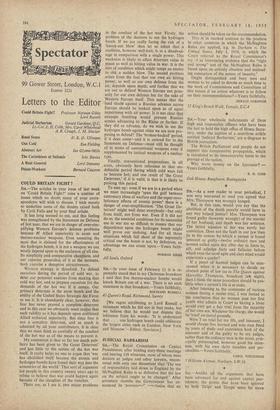Letters to the Editor
Could Britain. Fight? Professor Norman Gibbs Lord Russell Judicial Barbarism Gerald Gardiner,Q.C,.
Lt.-Col. E. H. Cobb, Mrs. Carol Whitehead A. R. Clough, J. M. Sinclair
Road Sense D. K. Q. Ullmann
Out Cold Xan Fielding Abstract Art Ian Glynne-Mills The Corinthians at Salamis lolo Davies A Real General Lord Dunsany Priest-Workers Bernard Causton
COULD BRITAIN FIGHT ?
SIR,—The articles in your issue of last week on 'Could Britain Fight?' raise a number of issues which no doubt many of your corre- spondents will wish to discuss. I wish merely to underline some of the doubts raised both by Cyril Falls and by your final article. It has long seemed to me, and this feeling was strengthened by the Statement on Defence of last year, that we are in danger of over-sim- plifying Western Europe's defence problems because Of Allied superiority in atom and thermo-nuclear weapons. Even assuming the most that is claimed for the effectiveness of the hydrogen bomb, it is not a weapon we can wisely depend upon to the exclusion of all else. Its simplicity and comparative cheapness, and our superior possesSion of it at the moment, both exercise a deceptive attractiveness.
Western strategy is threefold. To defend ourselves during the period of cold war, to deter our potential enemies from making that cold war hot, and to prepare ourselves for the demands of the hot war if it comes. Our primary deterrent is the atom bomb and the ability of the United States Strategic Air Force to use it. It is abundantly clear, however, that fear has never proved a complete deterrent and in this case we obviously must realise that such validity as it has depends upon continued Allied technical superiority. But since fear is not a complete deterrent, and so much is admitted by all your contributors, it is clear that we must think as carefully of the conduct of the hot war as of the means to prevent it.
My contention is that so far too much pub- licity has been given to 'the Great Deterrent' and 400 little to the nature of the hot war itself. It really helps no one to argue that 'war has abolished itself because the atomic and hydrogen bombs have found their way into the armouries of the world.' That sort of argument led people in this country twenty years ago to refuse to believe that war could happen again because of the slaughter of the trenches.
There are, as I see it, two major problems in the conduct of the hot war. Firstly, the problem of the decision to use the hydrogen bomb. If' we are really facing the risk of a 'knock-otit blow' then let us admit that a coalition, however well-knit, is at a disadvan- tage in comparison with a single power. This weakness is likely to affect deterrent value in peace as well as hitting value in war. It is the sort of condition which might tempt an enemy to risk a sudden blow. The second problem arises from the fact that our own air hitting power, as well as our own defence from the air, depends upon depth; and further that we are out to defend Western Europe not prim- arily for our own defence but for the sake of Western Europe itself. This means that the land shield against a Russian advance across Europe should be looked upon as of equal importance with air power. It is not clear that strategic bombing would prevent Russian armies advancing to the Rhine or farther. If they did so advance, do we wish to use the hydrogen bomb against cities we are now pro- posing to defend? The 'broken-backed' period, if it does come—and it is catered for in the Statement on Defence—must still be thought of in terms of conventional weapons even if supplemented by tactical weapons of a nuclear type.
Finally, conventional preparations, in all arms, obviously have reference to that un- definable period during which cold wars fail to become hot; and one result of 'the Great Deterrent,' if it is valid, is that it is likely to prolong this period.
To sum up : even if we are in a period when we must increasingly 'span the gulf between customary ideas of warfare and the super-revo- lutionary effects of atomic power' there is a danger of over-simplification. The Great De- terrent' might well deter everybody—but only from itself, not from war. Even if it did not do so, the essential conditions for its successful use in war are so difficult to ensure that our dependence upon the hydrogen bomb might well prove our undoing. And for all those situations which fall short of the supremely critical one the bomb is not, by definition, an advantage we can count upon.—Yours faith- fully,
NORMAN GIBBS All Souls, Oxford
*










































 Previous page
Previous page